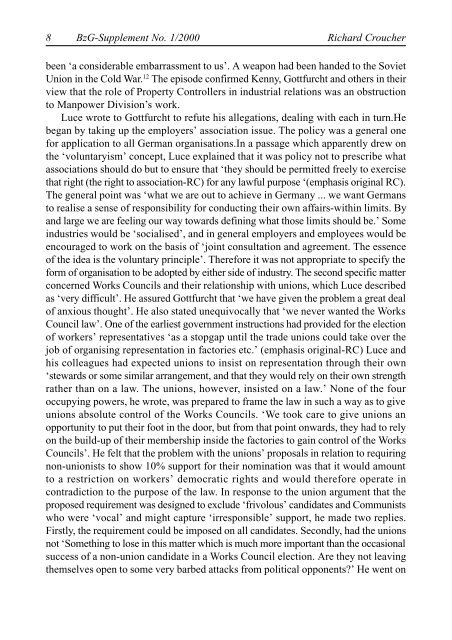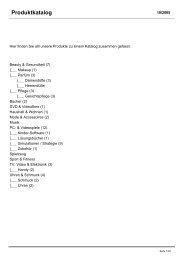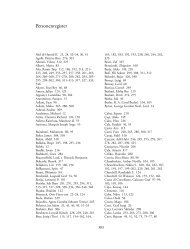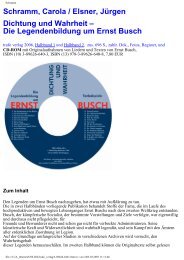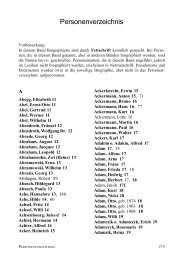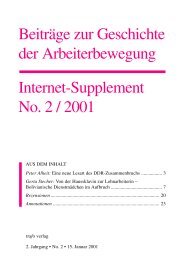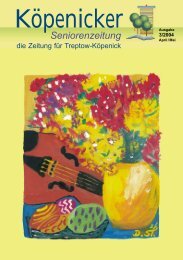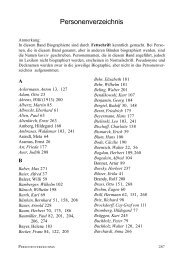Beiträge zur Geschichte der Arbeiterbewegung Internet-Supplement ...
Beiträge zur Geschichte der Arbeiterbewegung Internet-Supplement ...
Beiträge zur Geschichte der Arbeiterbewegung Internet-Supplement ...
Create successful ePaper yourself
Turn your PDF publications into a flip-book with our unique Google optimized e-Paper software.
8 BzG-<strong>Supplement</strong> No. 1/2000<br />
Richard Croucher<br />
been ‘a consi<strong>der</strong>able embarrassment to us’. A weapon had been handed to the Soviet<br />
Union in the Cold War. 12 The episode confirmed Kenny, Gottfurcht and others in their<br />
view that the role of Property Controllers in industrial relations was an obstruction<br />
to Manpower Division’s work.<br />
Luce wrote to Gottfurcht to refute his allegations, dealing with each in turn.He<br />
began by taking up the employers’ association issue. The policy was a general one<br />
for application to all German organisations.In a passage which apparently drew on<br />
the ‘voluntaryism’ concept, Luce explained that it was policy not to prescribe what<br />
associations should do but to ensure that ‘they should be permitted freely to exercise<br />
that right (the right to association-RC) for any lawful purpose ‘(emphasis original RC).<br />
The general point was ‘what we are out to achieve in Germany ... we want Germans<br />
to realise a sense of responsibility for conducting their own affairs-within limits. By<br />
and large we are feeling our way towards defining what those limits should be.’ Some<br />
industries would be ‘socialised’, and in general employers and employees would be<br />
encouraged to work on the basis of ‘joint consultation and agreement. The essence<br />
of the idea is the voluntary principle’. Therefore it was not appropriate to specify the<br />
form of organisation to be adopted by either side of industry. The second specific matter<br />
concerned Works Councils and their relationship with unions, which Luce described<br />
as ‘very difficult’. He assured Gottfurcht that ‘we have given the problem a great deal<br />
of anxious thought’. He also stated unequivocally that ‘we never wanted the Works<br />
Council law’. One of the earliest government instructions had provided for the election<br />
of workers’ representatives ‘as a stopgap until the trade unions could take over the<br />
job of organising representation in factories etc.’ (emphasis original-RC) Luce and<br />
his colleagues had expected unions to insist on representation through their own<br />
‘stewards or some similar arrangement, and that they would rely on their own strength<br />
rather than on a law. The unions, however, insisted on a law.’ None of the four<br />
occupying powers, he wrote, was prepared to frame the law in such a way as to give<br />
unions absolute control of the Works Councils. ‘We took care to give unions an<br />
opportunity to put their foot in the door, but from that point onwards, they had to rely<br />
on the build-up of their membership inside the factories to gain control of the Works<br />
Councils’. He felt that the problem with the unions’ proposals in relation to requiring<br />
non-unionists to show 10% support for their nomination was that it would amount<br />
to a restriction on workers’ democratic rights and would therefore operate in<br />
contradiction to the purpose of the law. In response to the union argument that the<br />
proposed requirement was designed to exclude ‘frivolous’ candidates and Communists<br />
who were ‘vocal’ and might capture ‘irresponsible’ support, he made two replies.<br />
Firstly, the requirement could be imposed on all candidates. Secondly, had the unions<br />
not ‘Something to lose in this matter which is much more important than the occasional<br />
success of a non-union candidate in a Works Council election. Are they not leaving<br />
themselves open to some very barbed attacks from political opponents?’ He went on


